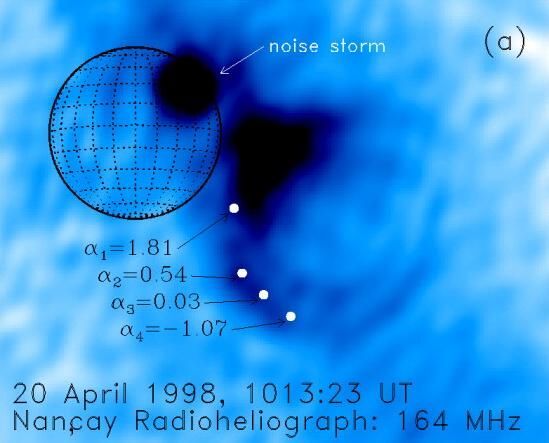Coronal Mass Ejection from the Sun
Description
A coronal mass ejection (CME) is the mass ejected from the Sun due to a solar flare. CMEs are recognized as primary drivers of disturbances in the interplanetary medium. As such, they can have a profound impact on the near-Earth environment. A long-standing problem has been understanding the origin of CMEs and the details of their relationship to a number of associated phenomena, including solar flares, coronal and interplanetary type II radio bursts, shocks, and solar energetic particle (SEP) events. This image shows the first time the expanding CME loops have been imaged directly at radio wavelengths. The image is a snapshot map of the radio CME at a frequency of 164 MHz at the time of maximum flux. The background emission from the Sun has been subtracted. Time variable radio emission from a noise storm is present to the northwest. The radio CME is visible as a complex ensemble of loops extended out to the southwest. Also shown is the spectral index measured at four locations in the radio CME. The radio-emitting CME loops are most likely the result of synchrotron emission from energetic electrons interacting with magnetic fields.
Brightness of the CME is saturated in the low corona because the map has been clipped at a level of 0.04 SFU beam-1, corresponding to a brightness temperature of TB ~ 2.6 ? 105 K.
Creator
Legacy Astronomical Images
Rights
NRAO/AUI/NSF does not hold full copyright for this image. Contact the archivist for details.
Type
Legacy Astronomical Image
Object Name
Sun
Investigators
Tim Bastian, Monique Pick, Alain Kerdraon, Dalmiro Maia, Angelos Vourlidas
Telescope
Nancay Radioheliograph
Observation Date
1998-04-20
Type of Observation
continuum
Frequency
164 MHz
Center of Image
RA 25:0:0.000, Dec: 0:0:0.000 (J2000)
Link to journal article
Series
Solar System Series
Unit
Sun Unit
Citation
Legacy Astronomical Images, “Coronal Mass Ejection from the Sun,” NRAO/AUI Archives, accessed April 3, 2025, https://www.nrao.edu/archives/items/show/33620.

